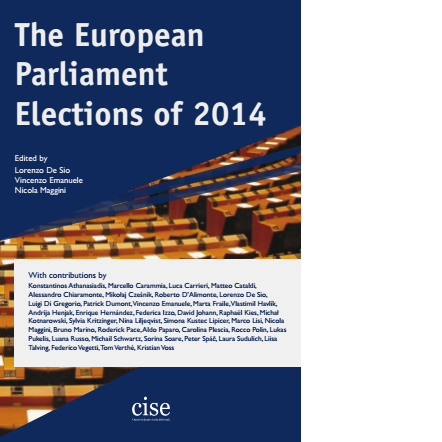Introduction
Lorenzo De Sio, Vincenzo Emanuele and Nicola Maggini
Part 1 – Before the elections
Towards the European elections: An introductory framework
Vincenzo Emanuele and Nicola Maggini
Life of EP: History of the empowerment of the European Parliament
Rocco Polin
The evolution of turnout in European elections from 1979 to 2009
Nicola Maggini
Proportional representation with variable-geometry: Here is how to vote in the 28 member states
Vincenzo Emanuele
Expansion and electoral success: The winning strategy of the EPP
Vincenzo Emanuele
United but loser? The PES between party cohesion and electoral decline
Michail Schwartz
The Alliance of Liberals and Democrats for Europe Group: Towards an inevitable decline?
Bruno Marino
From the Italian Communist Party to Tsipras: The path of Europe’s radical left
Federica Izzo
The populist and Eurosceptic right: The evolution of its electoral success
Nicola Maggini
Part 2 – The results: Italy
Electoral results: The PD from the “majoritarian vocation” to its realisation
Nicola Maggini
High fidelity and new votes for Renzi
Roberto D’Alimonte
Vote shifts in Rome and Milan confirm the frame of Renzi’s victory
Aldo Paparo and Matteo Cataldi
The Italian party system between change and stabilisation on new basis
Alessandro Chiaramonte and Vincenzo Emanuele
Where does Renzi’s victory come from?
Lorenzo De Sio
Part 3 – The results across Europe
Austria: No one loses, all win?
Carolina Plescia and Sylvia Kritzinger
The Baltic states: Mixed results for incumbents
Liisa Talving and Lukas Pukelis
Belgium: Far beyond second order
Tom Verthé
Bulgaria: To support or not to support the government in power, this is the dilemma
Sorina Soare
Croatia: Negative results for the government coalition
Andrija Henjak
Cyprus: Disapproval through abstention in the European Union’s remotest ‘outpost’
Konstantinos Athanasiadis
The Czech Republic: Where have all the voters gone?
Vlastimil Havlík
Denmark and Finland: (not always) a success for the far-right
Nina Liljeqvist and Kristian Voss
France: The historic victory of the Front National
Luana Russo
Germany: Merkel does not stand out but holds
Carolina Plescia and David Johann
Greece: Historic change or alarm bell?
Konstantinos Athanasiadis
Hungary: The stability of Fidesz’s domain
Federico Vegetti
Luxembourg: The first European Parliament–only vote
Patrick Dumont and Raphaël Kies
Malta: Hidden change?
Marcello Carammia and Roderick Pace
Poland: Old turnout and new right
Mikołaj Cześnik and Michał Kotnarowski
Portugal: Between apathy and crisis of mainstream parties
Marco Lisi
Romania: A preview of the 2014 presidential elections?
Sorina Soare
Slovakia: Record holder in the lowest turnout
Peter Spáč
Slovenia: Internal political crisis and the success of the opposition
Simona Kustec Lipicer
Spain: The beginning of the end of bipartisan rule?
Enrique Hernández and Marta Fraile
Sweden: An escape from mainstream parties
Nina Liljeqvist
Netherlands, Ireland and UK: Euroscepticism does (not) triumph
Laura Sudulich
Part 4 – The results: an overview
A turnout like in 2009 but with many “Europes” within the EU
Nicola Maggini
EPP loses votes and seats but remains the first party in the European Parliament
Vincenzo Emanuele
The Party of European Socialists: Stability without success
Luca Carrieri
German and UK’s Liberals collapse and ALDE loses ground
Bruno Marino
The radical left grows but only in the South of Europe
Michail Schwartz
The electoral progress of the populist and Eurosceptic right
Nicola Maggini
A “revolutionary” election: The Italian party system is the most simplified in Europe
Luigi Di Gregorio
Conclusions
Lorenzo De Sio, Vincenzo Emanuele and Nicola Maggini
